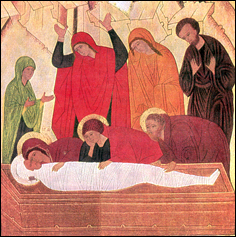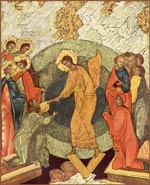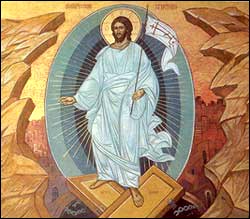 |
 |
|
 |
 |
|
|
 |
|
|
|
“Remember me, O Lord, when Thou comest into Thy kingdom!” (Luke 23:42)
|
|
Just when everyone renounced the humiliated and crucified Christ, the wise thief turned to Him with this penitent appeal. Just when the sentence of death put an end to the last hope in Him as Saviour on the part of Christ’s closest disciples, he, the wise thief, confessed Him as the Messiah. Just when Christ’s adherents abandoned their last dream of a messianic kingdom, the wise thief asked Christ to remember him in this Kingdom… “Today thou shalt be with Me in paradise,” replied the Divine Sufferer…
Who is this wondrous thief, who preceded everyone and was the first to enter the Kingdom of Christ? Who inspired him with such a living faith in the Crucified Christ? Where did he, a denizen of slums and thieves’ dens, hear words of salvation concerning the grace-filled Kingdom of Christ? What force made him an unparalleled follower of Christ, made him the wise thief? Verily the wise thief’s virtues were great, but great things are never achieved through insignificant means: both his virtues and his paradisiacal reward were acquired at a great cost.
Like Christ, the wise thief hung on a cross, suffering deathly torment, and in this terrible state he forgets himself and expresses the greatest reverence towards Christ. This patient endurance of suffering revealed in full force the godlike nature of the wise thief’s soul and immediately redeemed all the sins of his iniquitous life. This truly Christ-like endurance was his first great virtue…
“And we are condemned justly, for we have received the due reward of our deeds, but He hath done nothing amiss” (Luke 23:41). The wise thief does not ask for deliverance or miraculous help, as had demanded the iniquitous thief: “If Thou be Christ, save Thyself and us.” In his prayer of repentance he dares to ask for only one favor, only a single grain of mercy. “Remember”… only remember in Thy Kingdom that I, who have been justly condemned to eternal damnation, have also hung on this Golgotha; for me this will be great mercy and comfort. What depth of feeling and tenderness in this prayer of repentance! How brief and simple is this prayer! “Remember me, O Lord”… Only “remember”… How many millions of human hearts have been moved by this prayer for nearly twenty centuries; the prayer issued from such depths of humility and suffering that every Christian cannot but respond to it, cannot refrain from crossing himself, sighing softly and repenting inwardly. Humble obedience to Divine Truth – such was the second great virtue of the wise thief.
The wise thief presented to the entire world the amazing proof of how a man can fall into the depths of sin and iniquity and still retain the spark of a godlike nature; he showed that it was worth dying for such humanity, and that the distance between the abyss of human depravity and the height of divine grace is not too great or impassable: one decisive moment, one sigh of repentance, and salvation occurred, the wise thief became the first inheritor of the Kingdom of God. Thus the third virtue of the wise thief – a humble entreaty to be remembered – leads him into the Kingdom of God.
Wondrous is the conversion of the wife thief, but even more wondrous is divine forgiveness – Christ’s reply to the wise thief: “Today thou shalt be with Me in paradise.” The doors into the new and most holy Kingdom of God are opening, and the justly-condemned thief is being led into this Kingdom; to him Christ grants His last favor on earth and the first reward in heaven.
Let us, too, take these three decisive steps towards salvation: patient endurance of suffering, the realization of our guilt, and a humble prayer for mercy and forgiveness. Let us turn our eyes and hearts to Him, the Great Giver of absolution, and as we venerate the image of Christ our Saviour lying in the tomb, let us humbly purify our conscience, saying this prayer of repentance: “Remember me, O Lord, when Thou comest into Thy Kingdom.”
Metropolitan Vitaly (Ustinov)
|
|

Before every human tomb all worldly noise and hubbub cease. Each tomb speaks to us with its silence. Here ends all that began on earth. Here all human truth is curtailed. Here we can either weep inconsolably or seek another truth, another life…
Who among us is not familiar with these emotions? And what will we say, what will we feel as we stand at the Tomb of our Lord and Saviour?
“The hour is come that the Son of man should be glorified…” Truly it is here before us – the glory of the Son of man.
Humiliated and condemned, wounded, crowned with thorns, and dressed in a crimson robe, He is now here before us already without any breath of life, already wound up in a burial shroud…
Such is His glory… The glory of love, the glory of a voluntary offering of Himself for the life and the salvation of the world.
Stand, O Christian, before this awesome and mysterious Tomb. In order to save you, in order to return you to the Father’s embrace, your Saviour Himself came down to earth and drank the bitter cup of your suffering, took upon Himself the heavy burden of your sins. Turn your heart towards your Saviour.
The days are approaching when, by the mercy of God, the joy of holy Pascha will be revealed to all of us. But is our soul ready for this joy?... Is our heart pure?...
With its silence the Tomb of Christ appeals to the conscience of each one of us, summons us to stand before God’s Judgment under the fiery penetrating eyes of God’s Truth, which had been crucified, had suffered, had been buried.
“With desire I wish to eat this Passover with you,” the Lord says to us, as He did to His disciples. But God’s Passover can be partaken only by those who are able to wholeheartedly feel the morally obligating force of Christ’s suffering and respond to it with their entire life.
(Hieromonk Methody, “Before the eyes of God’s truth”)
(Reprinted from “Orthodox Russia, No. 15, 2007) |
|

The Resurrection.
16th century.
School of Dionysius. |
There finally came that “great and blessed Saturday” on March 18th, 34 A.D. - when the Only-begotten Son of God rested from all His deeds on earth. But there was no rest in Jerusalem: some were deprived of rest by their malice, while others could not rest because of heavy and oppressive sorrow. The enemies of Jesus continued to persecute Him even unto His grave, making sure to seal His tomb and putting guards around it. At the same time the Lord’s disciples suffered great sorrow: for all of them, except John the Theologian, had abandoned their Master and were now finding out from others about His last days - how He was humiliated, how He suffered horribly on the cross.
Bitter tears were shed by the apostle Peter, who had renounced the One Whom he had promised to love even unto death. But far more bitter tears were shed by the Mother of God, Whose soul - in accordance with righteous Simeon’s prophecy - was pierced by a sword.
|
|
|
Thus some gazed with anguish and other with gloating upon the silent, sealed and guarded tomb of the Saviour. But whatever took place in the meantime behind the doors of the grave was hidden from the world. Only the most precious Body of the Lord rested there; with His glorified soul He descended into hell, into the very bastion of Satan, that ancient murderer of mankind, where from time immemorial the souls of all the forefathers and the righteous languished, deprived of the bliss of paradise by the original sin. Saint John Damascene says: “The glorified soul of Christ descended into hell so that light would shine upon those living underground and in the shadow of death, just as the Sun of truth shone upon those living on earth; to both those on earth and those in hell Christ preached peace, freedom from captivity, return of sight to the blind, salvation to those who believed in Him, and He stood as accuser of the unbelievers.”
The day of Christ finally dawned for those who from faraway, separated by millennia, saw Him only in the shadow of images and prophecies. The holy men were already expecting Christ: the righteous Simeon had told them of His nativity on earth; John the Baptist had preached to them of His imminent arrival. And now, bringing with Him the teaching of the Gospel and the remission of sins, the Lord Himself descends into hell. With rapture and ineffable joy the host of forefathers and prophets greets Jesus Christ. St. Ephraim the Syrian thus describes this meeting: here, behind the gloomy confines of dismal hell, the Saviour “sees Adam, drowning in tears; He sees Abel, covered with blood as with a royal robe; He sees Noah, decorated with righteousness; He sees Abraham, crowned with all manner of virtue; He sees Lot, the purveyor of hospitality; He sees Job, shining with patience; He sees Moses, ordained by the hand of God. He approaches Joshua, son of Nun, and the latter is surrounded by his army; He comes up to Samuel, and the latter shines with the anointment of kings; He goes to David, and the latter is buried with the Psalter; He approaches Elisha, and the latter is clothed in a mantle. Isaiah joyously shows his head, which had been severed from him by a saw. Jonah glories in the salvation of the people of Nineveh. The eyes of Ezekiel flash brilliantly from his fearful visions. The feet of Daniel are still fresh from the licking of the lions. The head of the Baptist shines from its beheading. He sees also the holy women, equal in all things to their husbands. He sees each righteous man, looks upon each prophet - and proclaims: “It is I!”
|
|
Hell trembled upon meeting with the second Adam. The confines of hell crumbled. The dominion of death and Satan ended. All the righteous who had been devoured by death were now delivered.
Meanwhile, two days had passed on earth from the moment of Jesus Christ’s death on Golgotha. A feeling of restless rage stirred in the hearts of His murderers, who remembered well His prophecy of being resurrected on the third day; while in the hearts of Christ’s disciples there kindled a spark of vague hope that the Master’s divine power would be manifested. But stolidly, indifferent both to rage and to hope, stood the guards at the tomb where the Hope of all creation was buried.
|

The Resurrection.
Mural in the church of Sts. Peter and Paul in Luxembourg. |
|
|
In the deep silence of early morning, amid the peace and tranquility of nature, the Son of God arose from the sealed tomb without disturbing His burial sheets. According to the testimony of His holy Shroud, Christ was resurrected by a burst of incredibly powerful energy which far exceeded the power of atomic energy. There were no witnesses to this greatest of miracles on earth, - but they were not even needed: the entire subsequent history of the Church of Christ bears witness to the truth of the Resurrection.
The soldiers who guarded the tomb were eyewitnesses to the events which followed the Resurrection. Calmly they stood under the panoply of olive trees, peering attentively into the surrounding gloom of early morning. Suddenly they felt the ground tremble and an extraordinary light glittered like lightning, cutting through the air, - this was an angel of God, coming from heaven, who approached the tomb, pushed the stone away from the entrance and sat on the stone. The angel’s radiant appearance frightened the soldiers: in great fear they fell to the ground as dead. The earthly guard at the tomb of the resurrected Christ had ended, giving way to theheavenly guard. Christ was risen! - and the joyous morning of new life dawned for all creation.
Adapted from the monthly readings of St. Dimitri of Rostov.
|
 |
|
|
|
|
 |